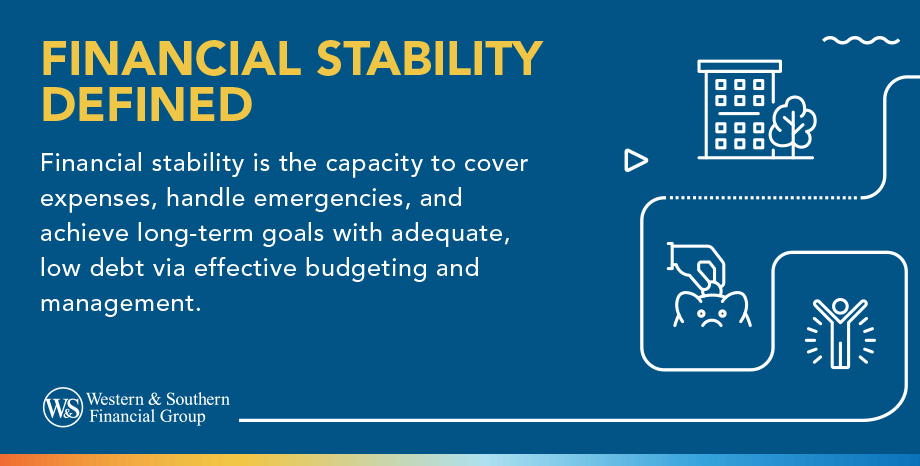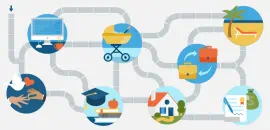

Key Takeaways
- Financial stability means feeling secure in handling money challenges, not just having savings.
- A positive money mindset helps you find opportunities and make better decisions.
- Learning about budgeting and investing builds confidence in managing finances.
- Small habits like saving automatically and budgeting lead to stability.
- Less financial stress improves mental health, relationships, and resilience.
The Psychology of Financial Stability
Understanding the psychological aspects of financial stability can help you build a stronger foundation for managing money. This section dives into what financial stability really means and how your mindset shapes your financial journey.
What Does Financial Stability Truly Mean?
Financial stability goes beyond having a certain amount of money saved or earning a specific income. It’s about feeling secure in your ability to handle life’s financial challenges without constant worry. True financial stability involves a sense of control and peace, even in uncertain times.
Here’s what contributes to financial stability:
- Clarity on Priorities: Knowing what matters most to you financially.
- Realistic Savings Goals: Setting achievable short- and long-term financial objectives.
- Preparedness: Having an emergency fund for unexpected expenses.
- Resilience: Adapting to financial imbalances and external economic changes.
- Financial Security: Helping ensure you have enough resources to sustain your lifestyle and goals.
- Managing Credit Cards Wisely: Using credit cards responsibly to build credit without accumulating unnecessary credit card debt.
Why Your Money Mindset Matters
Your mindset shapes how you view and manage money. If you’re stuck in a scarcity mentality - constantly feeling like there’s never enough - it can lead to stress and poor financial decisions. Shifting to a growth-oriented mindset can help you see opportunities to improve your situation.
Steps to shift your mindset:
- Identify Fears: Write down any financial fears or limiting beliefs.
- Replace Negative Thoughts: Use positive affirmations to challenge unhelpful thoughts.
- Take Action: Create small, actionable goals to build confidence and clarity.
- Leverage Knowledge: Learn from financial institutions or policies to make informed decisions.
- Aim for Financial Freedom: Establish habits that give you control over your money and reduce financial dependence.
A healthy money mindset fosters confidence and clarity, paving the way for lasting financial stability.
Building Confidence in Financial Decisions
Confidence in financial decisions is important for cultivating stability. This section outlines practical ways to trust your choices and improve your confidence through education.
Learning to Trust Your Financial Choices
Making financial decisions can feel overwhelming, especially if you’re worried about making mistakes. However, trusting your instincts and choices is key to building financial stability. Tips to build trust in your decisions:
- Educate Yourself: Learn about budgeting, saving, and investing.
- Start Small: Make simple decisions and build up to bigger ones.
- Accept Imperfection: Understand that no financial plan is flawless - what matters is progress.
- Understand Types of Debt: Certain debts, such as home mortgages, or student loans, may offer financial advantages, while others, like high-interest payday loans or medical bills, can create financial strain.
- Pay Bills on Time: Avoid late fees and maintain a strong credit rating by consistently paying bills on time.
The Role of Financial Education in Confidence
Confidence grows with knowledge. The more you understand personal finance, the more equipped you’ll feel to make sound decisions. Here are ways to boost your financial knowledge:
- Free Resources: Explore blogs, podcasts, and online courses.
- Workshops: Attend community or workplace financial education events.
- Read Books: Choose beginner-friendly personal finance books to deepen your understanding.
- Learn Policies: Familiarize yourself with market policies and central banks’ roles to understand broader economic factors.
- Assess Personal Loan Options: Knowing how different loans work can prevent financial strain.
- Plan for Emergency Expenses: Set aside funds for unexpected costs to prevent financial disruptions.
By continuously learning, you’ll reduce stress and feel empowered to set and achieve meaningful goals.
Developing Consistent Financial Habits
Building habits is one of the most practical ways to create financial stability. Small, consistent actions can lead to significant improvements over time.
The Power of Small, Consistent Actions
Big financial changes rarely happen overnight. Instead, focus on small, consistent actions that add up over time. Habits to consider:
- Automatic Savings: Set up automatic transfers to a savings account.
- Budget Regularly: Use a budgeting tool or app to track your expenses.
- Set Reminders: Schedule time monthly to review your financial progress.
- Understand Loans: Review your loan terms regularly and identify opportunities to refinance or pay down balances faster.
- Avoid Payday Loans: These loans often come with high interest rates that can lead to financial instability.
- Improve Financial Health: Regularly assess your financial situation and adjust your spending to align with your goals.
Tracking Progress Without Stress
Monitoring your financial progress doesn’t have to be overwhelming. Use simple tools to stay on track and celebrate milestones along the way.
Here’s how:
- Use Apps: Budgeting apps can make tracking easier.
- Keep It Simple: Track only key metrics like income, savings, and debt reduction.
- Celebrate Small Wins: Reward yourself when you reach milestones to stay motivated.
- Reassess Retirement Savings: Help ensure your long-term savings align with your retirement plan and adjust as needed.
By focusing on progress instead of perfection, you’ll feel more in control of your financial journey.
How Financial Stability Improves Your Overall Well-Being
Achieving financial stability has benefits that extend far beyond your wallet. When you feel financially secure, you experience less stress and anxiety, which can improve your mental and physical health.
Here are some ways stability enhances your life:
- Better Mental Health: Reduced financial stress leads to a calmer mind.
- Improved Relationships: Open communication about money fosters trust and partnership.
- Higher Quality of Life: Feeling secure allows you to focus on personal growth and happiness.
- Resilience During Crises: A stable financial position helps you navigate economic downturns and unexpected events.
- Financial Freedom: Achieving financial stability allows you to make life choices without being overly restricted by money concerns.
By prioritizing stability, you’re investing in a better quality of life.
Steps to Start Cultivating Financial Stability Today
Cultivating financial stability is a journey that starts with small, intentional steps. Here are actionable ways to begin:
- Focus on Your Money Mindset: Reflect on your beliefs about money and work to shift toward a growth-oriented perspective.
- Build Consistent Habits: Automate your savings, create a realistic budget, and track your progress to develop a strong financial routine.
- Seek Knowledge and Support: Take advantage of financial education resources to boost your confidence and decision-making skills.
- Create an Emergency Fund: Start saving a small amount monthly to cover unexpected expenses.
- Reduce Debt Gradually: Focus on paying down high-interest debt to free up money for other goals.
- Set Realistic Goals: Write down short- and long-term financial goals to guide your decisions.
- Review Regularly: Schedule time to review your financial progress and adjust your plans as needed.
- Manage Credit Cards Responsibly: Avoid carrying high balances and make timely payments.
- Pay Bills on Time: Reduce financial stress and build a solid credit score.
- Improve Financial Health: Continuously assess and adjust your financial situation.
Conclusion
Financial stability isn’t about perfection; it’s about progress. By focusing on your mindset, confidence, and habits, you can cultivate a sense of stability that supports your overall well-being and future goals. Start today and take control of your financial future.
Start building your financial stability today. Get My Free Financial Review
Frequently Asked Questions
What does "financially stable" mean?
What is financial stability vs financial instability?
Financial Stability:
- Steady income that covers expenses
- Sufficient savings for emergencies
- Manageable debt levels
- Ability to handle unexpected costs
Financial Instability:
- Inconsistent or insufficient income
- Little to no emergency savings
- High or unmanageable debt
- Struggling to meet financial obligations


















